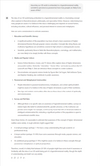This was a great interview, thanks to Jay and Hunter and Laura for putting it on.
In this conversation about the correct use of exogenous substances or xenobiotics, I think one distinction that needs to be emphasized a little more is the use of these substances to enhance spiritual or personal growth versus their use to remove organic or psychological imbalances that inhibit growth of awareness and assimilation of knowledge. A couple of examples brought up in the interview were the use of melatonin for oxidative stress in cells and circadian rhythm dysregulation, psilocybin for dealing with major depression, painkillers for certain conditions, as well as tobacco for Alzheimer's and certain genetic conditions.
There's also cerebrolysin, which is a mixture of neuropeptides derived from pig which has been shown to help people with traumatic brain injury, autistic spectrum disorder, vascular dementia, and other conditions. You could argue that because maybe some of the peptides in it aren't bioidentical to those in humans that it *may* be having some unforeseen and potentially negative effect, but in the context of managing other disorders I think it can be hard to argue on the basis of philosophy or theory against objective quality-of-life outcomes for some people. My two cents.
I think the last remark above about sums it up especially in respect of thinking one can grow spiritually with the help of drugs: "Once you make the choice to ask and not do the work, then it becomes easier and easier and you want more and more... and your own will and force becomes smaller and smaller..."
In this conversation about the correct use of exogenous substances or xenobiotics, I think one distinction that needs to be emphasized a little more is the use of these substances to enhance spiritual or personal growth versus their use to remove organic or psychological imbalances that inhibit growth of awareness and assimilation of knowledge. A couple of examples brought up in the interview were the use of melatonin for oxidative stress in cells and circadian rhythm dysregulation, psilocybin for dealing with major depression, painkillers for certain conditions, as well as tobacco for Alzheimer's and certain genetic conditions.
There's also cerebrolysin, which is a mixture of neuropeptides derived from pig which has been shown to help people with traumatic brain injury, autistic spectrum disorder, vascular dementia, and other conditions. You could argue that because maybe some of the peptides in it aren't bioidentical to those in humans that it *may* be having some unforeseen and potentially negative effect, but in the context of managing other disorders I think it can be hard to argue on the basis of philosophy or theory against objective quality-of-life outcomes for some people. My two cents.
Last edited by a moderator:

 . I was really taken for a ride. For example I met my deceased father-in-law but he was actually a lizard in disguise and there was a bit of energetic fighting. Before he sort of warped into a lizard it really sounded like is voice talking to me. So that was weird. Anyway after this experience I really feel that we can go on all sorts of trips with our endogenous DMT (If that is what it was). My partner says it was the Datura plant he just planted in the backyard that was calling to me
. I was really taken for a ride. For example I met my deceased father-in-law but he was actually a lizard in disguise and there was a bit of energetic fighting. Before he sort of warped into a lizard it really sounded like is voice talking to me. So that was weird. Anyway after this experience I really feel that we can go on all sorts of trips with our endogenous DMT (If that is what it was). My partner says it was the Datura plant he just planted in the backyard that was calling to me


